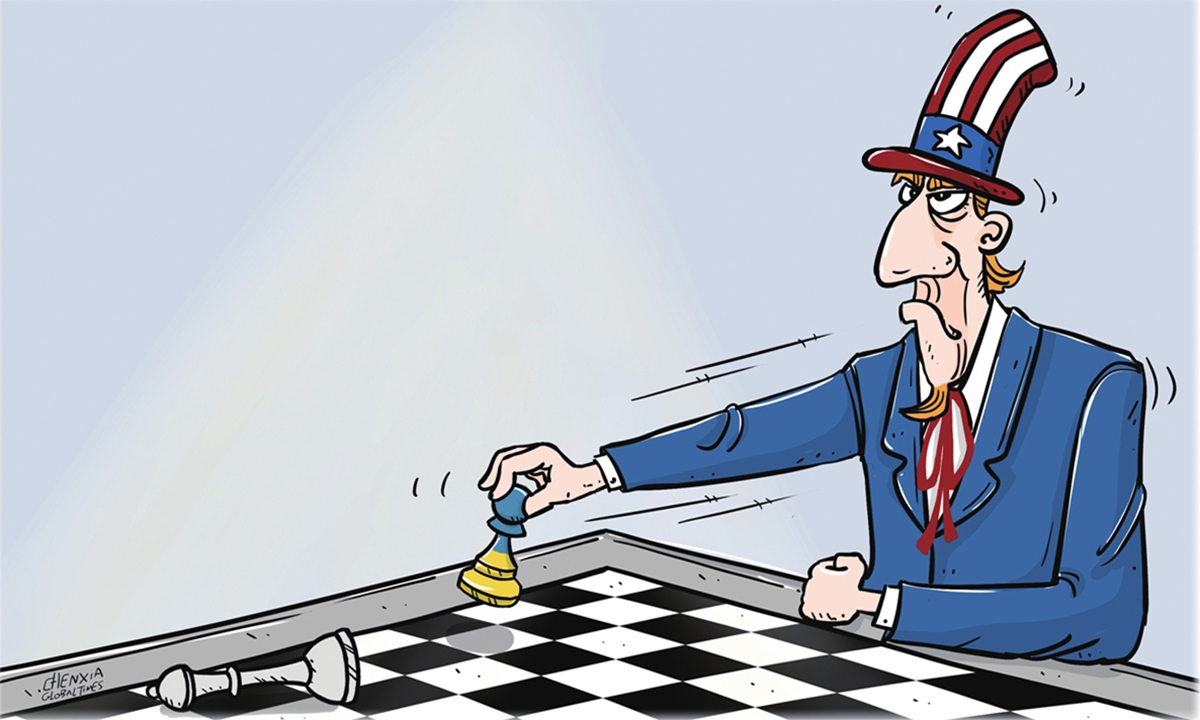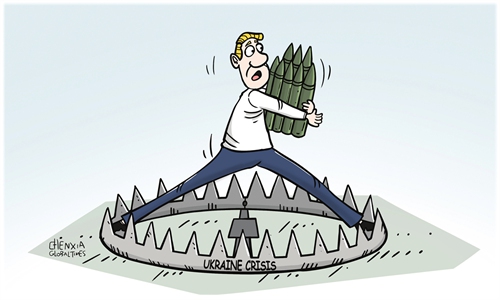
Illustration: Chen Xia/GT
According to US media reports, US Attorney General Merrick Garland announced on Friday the first transfer of forfeited assets from sanctions against a Russian oligarch during an appearance with Ukrainian Prosecutor General Andriy Kostin at the US Justice Department. The assets, confiscated from Russian oligarch Konstantin Malofeyev after his indictment on sanctions evasions in April, will go toward aiding Ukraine.US sanctions against Russia are illegal and are unilateral moves unauthorized by the United Nations. Now the US is even transferring the personal assets of Russian individuals to others, which highlights the plundering nature of the US as a robber.
The transfer of assets is a high-profile political stunt, which the US government is pretty good at. The $5.4 million assets can be just pocket money for the US - it offers to Ukraine as aid, while Ukraine would use it to buy weapons from the US to feed the US military-industrial complex. This reminds people of how the US dealt with the $7 billion in frozen funds from Afghanistan's central bank. In February 2022, US President Joe Biden signed an executive order allowing approximately half of the $7 billion to be reserved for victims of 9/11 attacks, which means the US keeps the money for its own. This is the very US - robbing money while at the same time appearing to be compassionate for others.
On the one hand, the US makes a profit from war. On the other, it aims to achieve its geopolitical goal through war. Recently, the US and some Western countries said they will ship a huge, wide-ranging package of heavy weapons to Ukraine, a move that obviously will intensify the situation. Xu Liang, an associate professor at the School of International Relations of Beijing International Studies University, told the Global Times that the US transferring the assets of a Russian oligarch is extending actions of supporting Ukraine from military aid to the economic sphere, which can be seen as another move to escalate tensions.
"It cannot be ruled out that the US would give confiscated national assets of Russia to the Ukrainian government. The US has viewed Russia as its de facto enemy in the economic sphere, and the US may carry out all possible means to suppress Russia," said Xu.
Cui Heng, an assistant research fellow from the Center for Russian Studies of East China Normal University, told the Global Times that the US' strategy of imposing maximum pressure on Russia has been escalating via salami-slicing tactics, so as to gain more bargaining chips in the Russia-Ukraine conflict. Cui noted that one of the US' aims is to set a model for Europe.
"If Europe does not follow, it means Europe is not 'politically correct.' Just like after the US said it would deliver M1 Abrams battle tanks to Ukraine, Germany acted 'in close coordination' by deciding to send Leopard 2 battle tanks to Ukraine. Similarly, the US hopes Europe can imitate its transfer of Russian assets," said Cui.
Cui noted that if under US pressure, Germany and France are propelled to keep a distance with Russia, they would lose their strategic autonomy in the conflict. The European Council president has already urged European capitals to push forward with talks on using $300 billion worth of confiscated Russian central bank assets for the reconstruction of Ukraine.
After all, the US only cares about its own interests. In the Russia-Ukraine conflict, US' goal is to weaken or even drag down Russia to strip Russia of the ability to challenge the Western world. By assisting Ukraine, the US has squeezed the negotiation room in the Russia-Ukraine battlefield and prolonged the conflict. Europe has paid a heavy price for the worsening security situation around it, while the US has benefited the most and been on the way of achieving its objective of consolidating the global order led by itself and maintaining its hegemony.
Obviously, the US does not want to spend a single penny on the conflict. Xu believes that US' transferring of Russian assets to Ukraine will only backfire in the long term. It shows that the assets in the US of any individuals may be deprived due to international relations. This will consume US' credibility to a large extent, leading to many countries in the non-Western camp to step up efforts to "de-dollarization," and the "dollar hegemony" of the US will be dealt a heavy blow and risk facing with an end.



